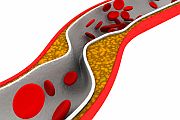If approved, medications could be used by patients who don’t respond to statins
TUESDAY, April 28, 2015 (HealthDay News) — A new class of cholesterol medication could sharply cut low-density lipoprotein (LDL) cholesterol in patients who don’t fare well on statins, a new research review confirms. The findings were published online April 28 in the Annals of Internal Medicine.
The drugs, known as PCSK9 inhibitors, are not yet on the market. But the U.S. Food and Drug Administration is expected to decide later this year on the first two medications in the class: evolocumab (Repatha) and alirocumab (Praluent). A team of researchers led by Eliano Navarese, M.D., Ph.D., of Heinrich Heine University in Dusseldorf, Germany, pooled the results of 24 clinical trials involving 10,159 patients. Some compared a PCSK9 inhibitor to a placebo, while others used ezetimibe (Zetia) for comparison.
The review of 24 clinical trials found that PCSK9 inhibitors lowered patients’ LDL cholesterol by about 47 percent, on average. More importantly, the drugs seemed to cut the risk of myocardial infarction and cardiovascular mortality, according to the researchers.
“The initial clinical trial experience with PCSK9 inhibitors fuels cautious enthusiasm,” write the authors of an accompanying editorial. “The meta-analysis by Navarese and colleagues provides important preliminary information on clinical outcomes as the FDA considers approval of PCSK9 inhibitors for clinical use. Confirmation of these findings in long-term, ongoing, pivotal trials with prespecified primary cardiovascular disease end points and monitoring of a broad range of adverse events will help establish the role of these novel agents in cardiovascular disease risk management.”
Copyright © 2015 HealthDay. All rights reserved.








